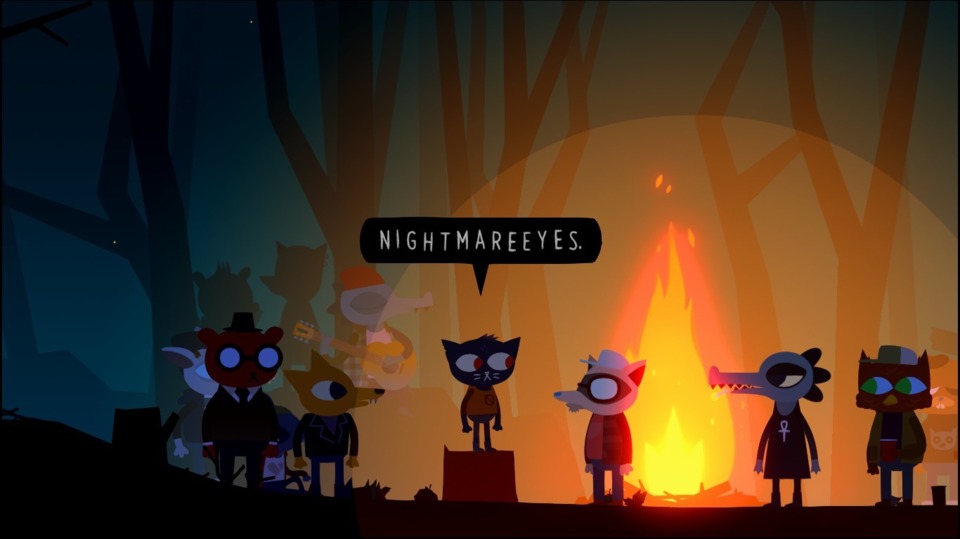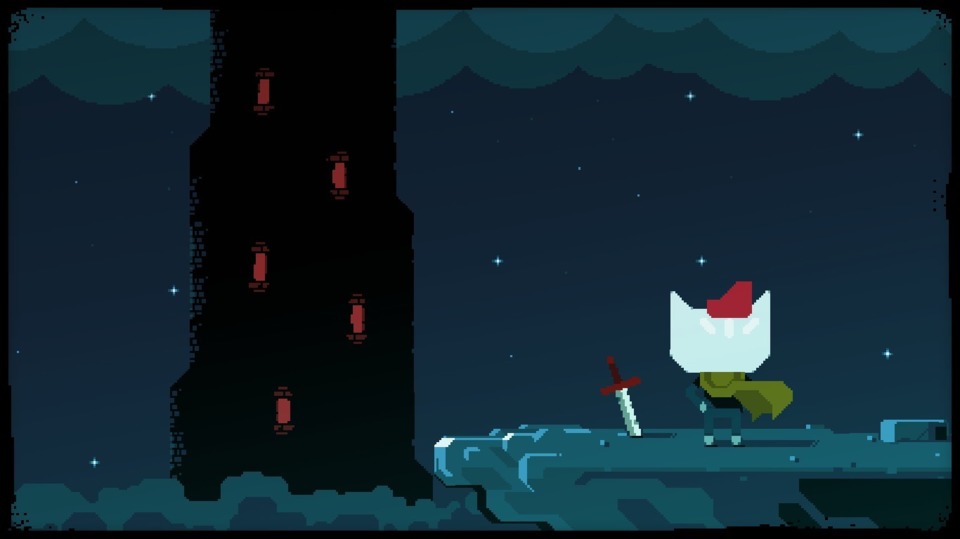Indie Game of the Week 184: Night in the Woods
By Mento 6 Comments

Night in the Woods is one of those known quantities I'll sometimes work into this feature, like I'm spackling over a conspicuous gap in my own playing history than introducing something fairly obscure to what I'm hoping is a receptive audience of Indie-lovers. The brainchild of animator/illustrator Scott Benson and helped into video game reality by someone we probably don't need to name here, Night in the Woods is a... charitably, I think we'd call it an adventure game with an open-world aspect, but might more accurately name it a hanging out not doing much in particular simulator, or a HONDMIPS. I've noticed the HONDMIPS genre picking up in the Indie scene in recent years with the likes of Always Sometimes Monsters and, uh, that top-down coffee shop game Jan played a while back whose name I can't recall, as I suppose it fits the truism that you "write what you know": many creative types - myself assuredly included - are painstakingly familiar with the stage of a person's life where gainful employment and affording food to eat is an ever present threat to any and all artistic aspirations.
Night in the Woods follows Margaret "Mae" Borowski: a college dropout who finds herself returning to her depressing, run-down hometown of Possum Springs while she procrastinates on having to think about the next stage of her life. A few of her highschool friends are still around, including the overexcitable Gregg and lugubrious Bea (both of which working retail jobs they more or less hate), and Mae's old troublemaking behavior re-emerges as she follows a mostly nocturnal routine each day that starts late afternoon and terminates around midnight. There's also suggestions that something less than wholesome is affecting the town, though we're only getting hints of that in the opening chapters (like a severed arm in the middle of the street). Honestly, a lot of Mae's hometown blues hits uncomfortably close to home for me, and is a phase of my life I'm loath to revisit; more so than highschool even, since at least I was in the same boat as everyone else at that age and didn't feel like quite as isolated. Granted, I never dropped out of college like Mae did, but finding yourself stuck back in the quiet burg in the middle of nowhere that you were raised in, faced with the real possibility of never leaving again, is one of those unenviable situations that can be and has been the source of a lot of consternation and grief. I'm making it sound like this game is digging up a lot of past trauma, which it honestly isn't, but I know that there's drama on the horizon that neither I nor Mae wants to reckon with any time soon. Better to just throw rocks at windows and smash fluorescent tubes until the situation somehow resolves itself, for as self-defeating as that attitude is.

Anyway, when the game isn't making me feel bad emotions, it's making me feel good ones. The writing is delightful, with even incidental characters getting some amusing backstories and dialogue chains with Mae, who bounces between real and faked interest. Each day brings with it a number of possible activities to do around town, almost none of them essential beyond filling the playthrough with low-key shenanigans and optional worldbuilding. The visuals are also excellent: I can take or leave another game where all the principal cast are anthros and never seem to address it (it scrambles the gray matter a little that there are actual cats in a world with catpeople, where the catpeople even keep the cats as pets; I don't know how to logically parse any of that) but the character designs and backgrounds have this angular but cute look reminiscent of this excellent Beartato webcomic I used to read until its author decided to update once every other year. It also manages to hit that same easy-going groove that Mutazione does (though I should clarify that Night in the Woods came first) where you never have to walk around town talking to all the NPCs after a chunk of time has passed, but you find yourself wanting to anyway just to spend more time around these people and figuring them out for the sense of community it brings and for more of the game's mostly terrific writing. I also like that Mae regularly sketches in her journal after something piques her interest, either from an encounter or a remarkable object in the background; like the similarly arty journal entries in Life is Strange, it's both a window into the interiority of the protagonist as well as an occasional source of humor.
And now for the two other major bummers about the game, beyond the self-loathing early-20s awkwardness: the mini-games and the sense of FOMO that permeates its daily itinerary format. On the former: there's a compelling top-down hack'n'slasher introduced as a game-within-a-game that starts to lose its allure quick by decreasing your maximum health the further you climb its titular Demon Tower despite also increasing the difficulty of its bosses and regular enemy encounters; the other mini-game is an exasperating Guitar Hero rhythm game with enough lag to make me terrible at it, and the game makes you feel bad for playing badly (just as Dr. Zoidberg would have it). There's a few lesser mini-games, like a thievery-themed version of Red Light, Green Light and a vaguely interactive astronomy lesson on the lesser known "dusk star" constellations, but they're not quite as aggressively unfun. All the same, most of these are either incidental or have no bearing on the game progression if you screw them up, but they don't really add anything either. The FOMO thing, meanwhile, comes from when you're given options on how to spend each day and more specifically who you spend them with, perhaps the idea being that you play through the game again to see the other "route" while presumably taking note of all the clever foreshadowing the game may or may not be doing. I'm not really a "two playthroughs" kinda guy though, especially with an lesiurely paced adventure game like this where it takes a long while to move around and finish story sequences, so I'm just going to have to deal with not seeing a good portion of the game (unless there's a chapter select of which I'm not aware).

On the whole, and personal life stuff-related reservations aside, it's easy to see the appeal of the game and why it peppered so many GOTY lists back in 2017 despite all the heavy competition that year. It speaks to that uncomfortable, formative period in most of our lives where we were largely rudderless and enjoying our new-found independence and "adult" pursuits as a means to actually avoid being responsible adults for as long as possible. Once you sober up and take a long hard look towards the exhausting endless highway of nonsense that is adult living, you either shape up or burn out; that is to say, you either become Scarlett Johansson's character in Ghost World where you focus on finding a job that doesn't suck and eventually work up to starting families and owning your own place, or become Thora Birch's character in Ghost World where you fuck around with the local weirdos and relive the hits of your childhood until you eventually give up and take that mysterious bus to nowhere. I could also understand how that sort of post-adolescent navel-gazing could rub folks the wrong way - most of the hardscrabble grown-ups of Possum Springs aren't exactly receptive to Mae's "problems" either - especially if they're already put off by all the teenspeak dialogue and the directionless core progression as you bounce from one late evening juvenile antic to another. My opinion lies somewhere in the middle: while I can appreciate NitW's strengths (presentation, dialogue) I can also despair of its missteps and occasionally grating attitude. Still, I'd like to see where its story eventually goes, as well as keep up with the gaggle of strange townies I keep bumping into. I just hope my curiosity doesn't kill the cat, so to speak.
Rating: 4 out of 5. (Post-Completion Edit: Upgraded to 4, since I did enjoy my time with these characters despite the gripes.)
| < Back to 183: Forever Lost (Ep 1) | The First 100 | > Forward to 185: Monster Boy and the Cursed Kingdom |
